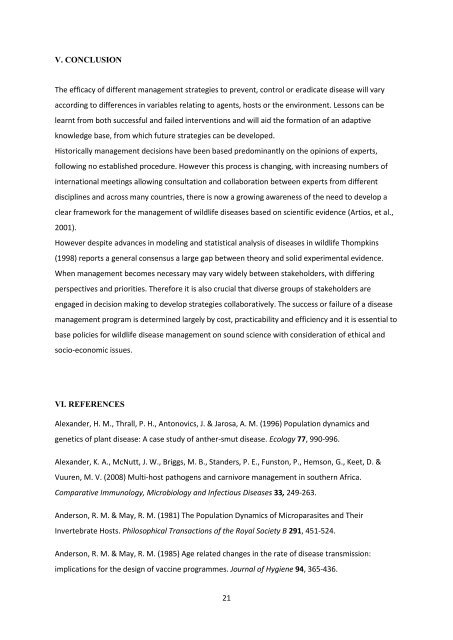Developing an oral bait for badger vaccination - Exeter Research ...
Developing an oral bait for badger vaccination - Exeter Research ...
Developing an oral bait for badger vaccination - Exeter Research ...
Create successful ePaper yourself
Turn your PDF publications into a flip-book with our unique Google optimized e-Paper software.
V. CONCLUSION<br />
The efficacy of different m<strong>an</strong>agement strategies to prevent, control or eradicate disease will vary<br />
according to differences in variables relating to agents, hosts or the environment. Lessons c<strong>an</strong> be<br />
learnt from both successful <strong>an</strong>d failed interventions <strong>an</strong>d will aid the <strong>for</strong>mation of <strong>an</strong> adaptive<br />
knowledge base, from which future strategies c<strong>an</strong> be developed.<br />
Historically m<strong>an</strong>agement decisions have been based predomin<strong>an</strong>tly on the opinions of experts,<br />
following no established procedure. However this process is ch<strong>an</strong>ging, with increasing numbers of<br />
international meetings allowing consultation <strong>an</strong>d collaboration between experts from different<br />
disciplines <strong>an</strong>d across m<strong>an</strong>y countries, there is now a growing awareness of the need to develop a<br />
clear framework <strong>for</strong> the m<strong>an</strong>agement of wildlife diseases based on scientific evidence (Artios, et al.,<br />
2001).<br />
However despite adv<strong>an</strong>ces in modeling <strong>an</strong>d statistical <strong>an</strong>alysis of diseases in wildlife Thompkins<br />
(1998) reports a general consensus a large gap between theory <strong>an</strong>d solid experimental evidence.<br />
When m<strong>an</strong>agement becomes necessary may vary widely between stakeholders, with differing<br />
perspectives <strong>an</strong>d priorities. There<strong>for</strong>e it is also crucial that diverse groups of stakeholders are<br />
engaged in decision making to develop strategies collaboratively. The success or failure of a disease<br />
m<strong>an</strong>agement program is determined largely by cost, practicability <strong>an</strong>d efficiency <strong>an</strong>d it is essential to<br />
base policies <strong>for</strong> wildlife disease m<strong>an</strong>agement on sound science with consideration of ethical <strong>an</strong>d<br />
socio-economic issues.<br />
VI. REFERENCES<br />
Alex<strong>an</strong>der, H. M., Thrall, P. H., Antonovics, J. & Jarosa, A. M. (1996) Population dynamics <strong>an</strong>d<br />
genetics of pl<strong>an</strong>t disease: A case study of <strong>an</strong>ther-smut disease. Ecology 77, 990-996.<br />
Alex<strong>an</strong>der, K. A., McNutt, J. W., Briggs, M. B., St<strong>an</strong>ders, P. E., Funston, P., Hemson, G., Keet, D. &<br />
Vuuren, M. V. (2008) Multi-host pathogens <strong>an</strong>d carnivore m<strong>an</strong>agement in southern Africa.<br />
Comparative Immunology, Microbiology <strong>an</strong>d Infectious Diseases 33, 249-263.<br />
Anderson, R. M. & May, R. M. (1981) The Population Dynamics of Microparasites <strong>an</strong>d Their<br />
Invertebrate Hosts. Philosophical Tr<strong>an</strong>sactions of the Royal Society B 291, 451-524.<br />
Anderson, R. M. & May, R. M. (1985) Age related ch<strong>an</strong>ges in the rate of disease tr<strong>an</strong>smission:<br />
implications <strong>for</strong> the design of vaccine programmes. Journal of Hygiene 94, 365-436.<br />
21
















